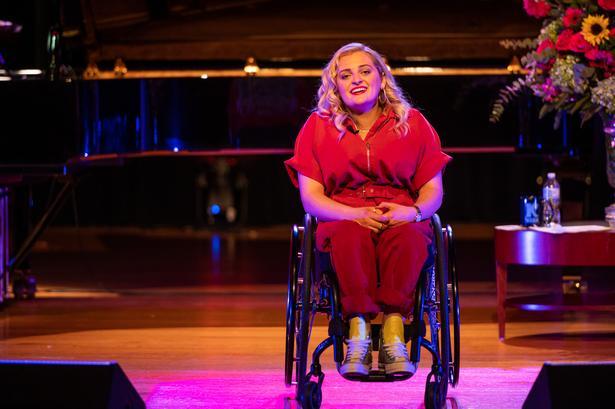Kean Stage Leads on Accessibility in the Arts

Tony Award-winner Ali Stroker gave a concert at Kean's Enlow Recital Hall that featured closed captioning and live American Sign Language interpretation.
Kean Stage is emerging as a leader in accessible theatre, offering sensory-friendly performances for children, sign-language interpretation and other measures to dismantle barriers to the arts for all audiences.
Most recently, Kean Stage featured a virtual concert by Tony Award-winner Ali Stroker with closed captions and American Sign Language (ASL) interpretation.
“Kean Stage operates with a focus on diversity, equity, inclusion and accessibility in our hiring of staff, talent and crew, and in building an enjoyable experience for all audiences,” said Steve Cochran, manager of Kean Stage. “The virtual space created by the pandemic has brought new challenges and opportunities for us to learn more about what’s possible and reaffirm how important it is for us to prioritize accessibility in all that we do.”
Kean Stage has a history of developing accessible performances. One of its last live concerts before the COVID-19 shutdown was with Mandy Harvey, a Deaf singer-songwriter. It featured an ASL choir of Kean students. Kean Stage, in partnership with the School of Communication Disorders and Deafness, has also offered sensory-friendly children’s performances for children with autism spectrum disorder, with lowered lights and sound and play stations. Each year, Kean Stage also collaborates with Sing Aphasia, a choir comprised of people living with aphasia and their allies, in a concert at Wilkins Theatre.
The concert by Stroker was livestreamed from the stage of Enlow Recital Hall on Kean University’s East Campus. In addition to live ASL interpretation, the concert featured on-screen CART (Communication Access Realtime Translation) which, using equipment similar to that of a court reporter, transcribes the concert in realtime for the Deaf or hard of hearing.
During her performance, Stroker took a break to thank Kean Stage for its commitment to accessibility. “In my opinion, that [captioning and ASL interpretation] is what it should be across the board with every live performance or virtual livestream,” she said.
Stroker, who sustained a spinal cord injury at the age of two, made history as the first actress in a wheelchair to appear on Broadway, originating the role of Anna in Deaf West's 2015 revival of Spring Awakening, which was performed entirely in English and ASL. In 2019, she earned a Tony Award as best supporting actress in a musical for her role as Ado Annie in Broadway’s Oklahoma!
On stage at Enlow Hall, Stroker spoke to the importance of authentic representation for the one in four people living with a disability in the United States.
“I want to continue creating stories and art where there are characters who have disabilities, but their storylines and the conflict of their lives are not their disability,” said Stroker. “For a lot of people with disabilities, and I can speak for myself, my life is so full. I just want to see ourselves represented in new and different lights — on stage, on camera, on screen, in print ads and commercials — to see more models with all different kinds of abilities.”
Data from Stroker’s concert shows there is demand for accessible performances. Nearly 100 ticket holders used closed captions, approximately 20% of those who watched the livestream. It’s likely more people viewed it with each purchased ticket.
Shameka Andrews, a disabled advocate and disability consultant from New York State, found out about the event at one of the weekly online groups she has attended since the start of the pandemic.
“It was really awesome to see a great concert right from my home and still be able to connect with friends because we were all watching it at the same time, even though we weren’t together,” Andrews said. “Technology and the added accessibility has enabled me to attend many events I was not able to participate in prior to the pandemic.”
Andrews and other members of the Spina Bifida Resource Network organized a virtual after party following the show and, with the help of Kean Stage, arranged for Stroker to stop in for a quick hello. Prior to the event, Stroker also visited with members of Sing Aphasia, which is led by two-time Kean alumna Gillian Velmer, SLPD.
“The show was awesome! Ali was so friendly and talented. Just watching her made me smile,” said Bernice O’Kane, a member of Sing Aphasia. “The party before was fun. Glad we got to meet and talk with her and everyone from Sing Aphasia.”
For Kean Stage, the concert captured Stroker’s motto: “turning your limitations into your opportunities” in previously unexplored ways.
“Now that more people have felt the joy of being invited into these spaces as they are, the question remains how the arts community will maintain and continue to expand this accessibility long after the pandemic is over,” Cochran said. “Accessibility is a process, but we have a responsibility to our audiences and, through Kean Stage’s progress, we can show others how it can and should be done.”